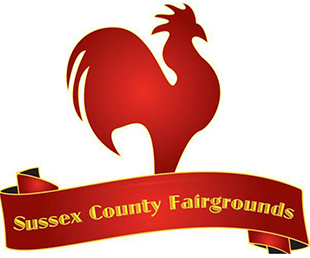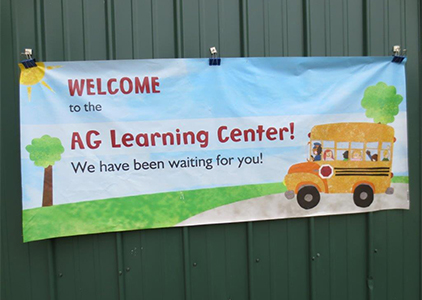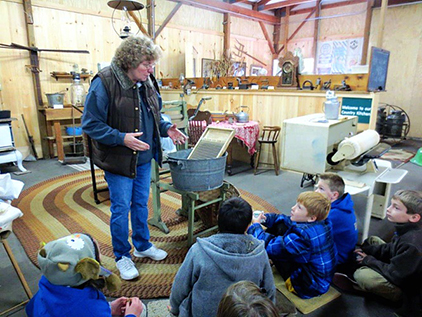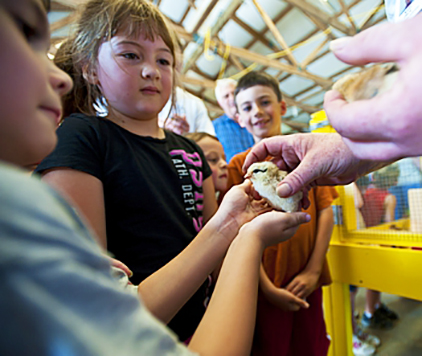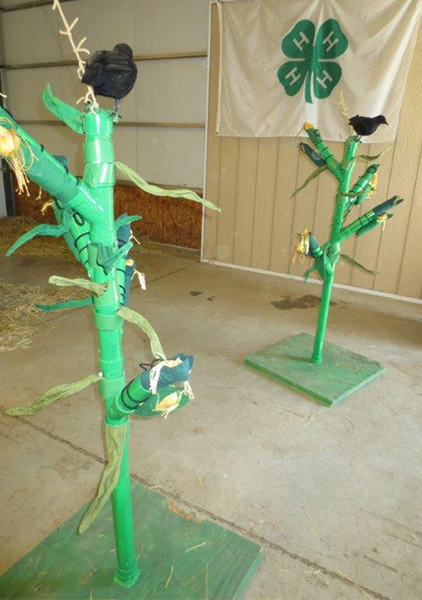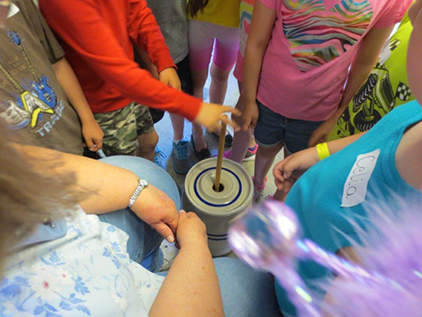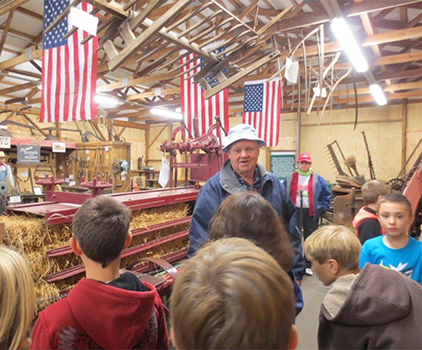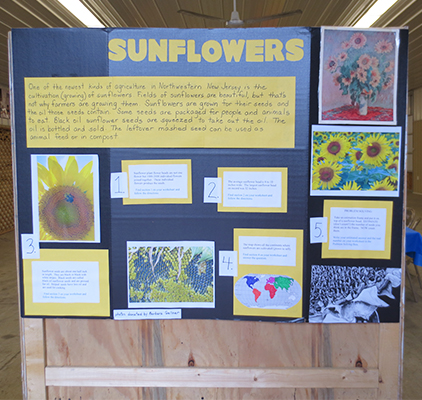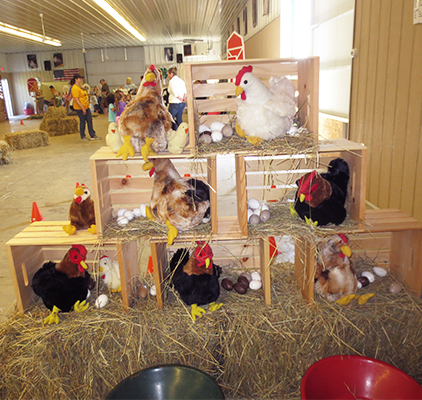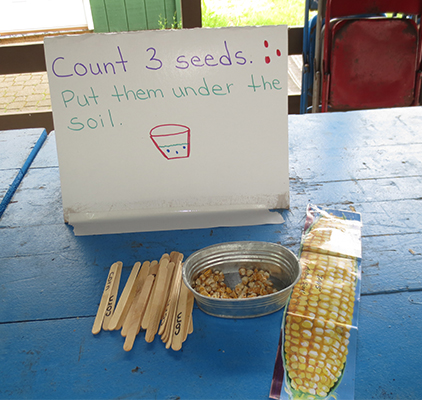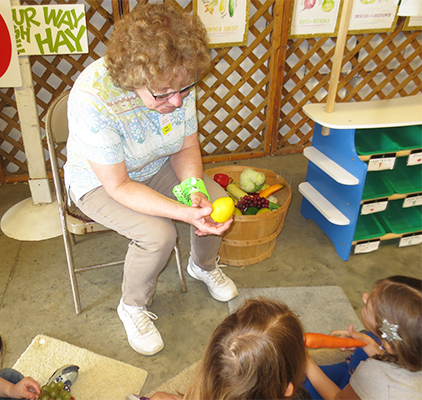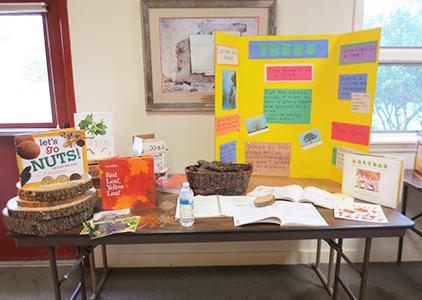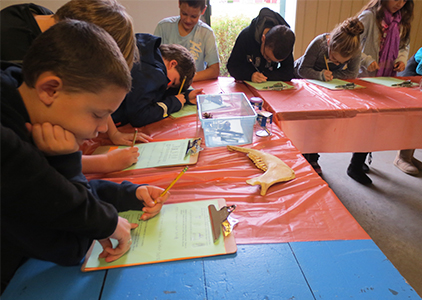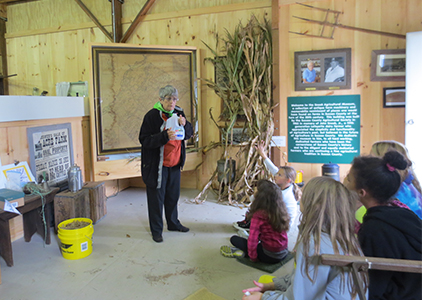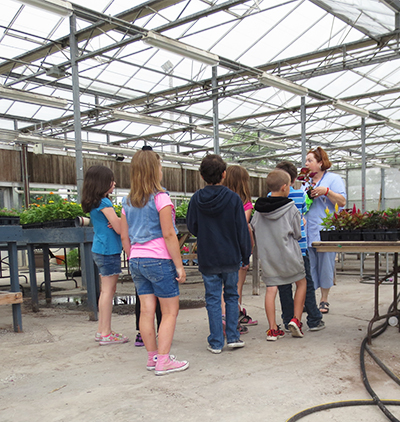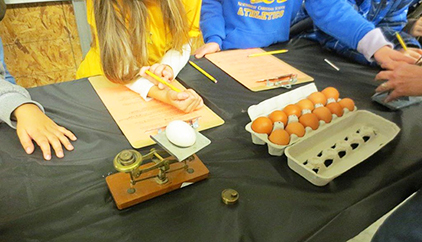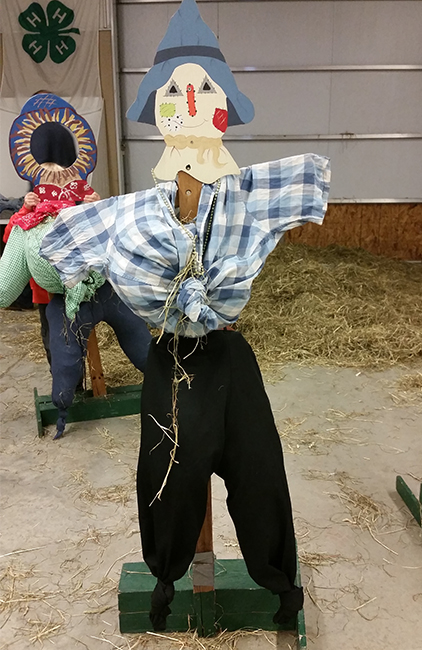Programs & Class Trips
The Ag Learning Center offers a variety of unique and engaging hands-on agricultural learning opportunities for students and teachers both in the classroom and on-location at the Sussex County Fairgrounds facilities. For information contact Kathy Cafasso, Program Director at kcafasso@njstatefair.org.
The AG Bag Program
The Ag Bags are offered as a free service from the AG Learning Center to help educators infuse agriculture into a regular curriculum using literature and concept support materials. They were developed by former teachers with experience in PreK-gr. 5.
Bags include hard and softcover books [primarily non-fiction], sample materials, and other materials as needed. A notebook is included with various projects/lessons/activities that address science, social studies, language arts, art, etc. We deliver and pick up, and teachers may use the materials for two weeks. Topics include:
- Apples
- Bees
- Berries/Blueberries for Sal
- Christmas Tree Farms
- Communities
- Cranberries
- Ecology, Energy & Individual Responsibility
- Farms
- Gardens and Plants
- George Washington Carver
- Maple Trees
- Plants: Vegetables & Fruits
- Pollinators/Butterflies
- Pumpkins
- Sheep/Fiber
- Sunflowers
- Water
Click here to view the AG Bag Catalog
Borrow Box Program
Borrow equipment for your classroom to make ice cream, vegetable soup, popcorn, applesauce, etc., or hatch chicks. Click here to view the Borrow Box Catalog
Class Trips
All programs can be adjusted to fit your time constraints. The learning experiences described below offer age-appropriate information and activities. They were designed by elementary-level educators. Each program is about two hours long. Staff can work with you to personalize a visit. Admission is low; adults are free. There is a limited number of parents allowed to accompany the students. Classes may bring a snack and or lunch as part of their visits. Bathroom facilities are located a short walk away.
For more information, or to make a reservation, contact Program Director Kathy Cafasso.
Fourth Grade - 'Agriculture Time Machine' (October/early November) - Currently not available for Fall 2023
This program has been developed for fourth-grade students and runs 2-2 ½ hours. It is located in the Snook Agricultural Museum and the Shotwell 4-H Building in the Agricultural Area of the Fairgrounds. The program consists of a look at agriculture in the past and present in Sussex County and New Jersey and supplements the study of the history of New Jersey. Students visit six stations.
Agriculture Past [Snook Agricultural Museum]
- 1905 kitchen—modern labor-saving devices of the day compared to current day, jobs & responsibilities of family members, Hands-on: making butter & eating it
- Farm Equipment—machinery for milking/threshing/harvesting, hand tools, Hands-on: shelling & grinding corn
- Forage—uses of hay and straw, water consumption of dairy cows, how corn grown for animals is used, Hands-on: the game Needle in the Haystack
Agriculture Present [Shotwell 4-H Building]—hands-on investigations
- Sunflowers—reasons for growing sunflowers, kinds of sunflower seeds, investigation of sunflower heads, predicting, measuring, making connections
- Chickens—raising chickens, kinds of chickens, diagram of an egg, sizes of eggs, measuring eggs, math comparing chickens with people
- Dairy Cows—kinds of dairy cows, comparing cows' teeth with people's teeth, the use of magnets in cows' stomachs, the compartments in a cow's stomach, milk production by state, drawing conclusions
Primary Grades — 'The Plant Program' (March/April, $4 per student)
This program highlights plants. It is suitable for grades 1-3. There are 6 stations for each grade level. Some topics progress through more than one grade level. The programs run for about hours [snack/lunch may be added.] The program can run without parent volunteers, but a maximum of 6 per visit is allowed.
Grade 1: Water [water to land ratio on Earth], Seed Dispersal [how do seeds move] What's in a Seed [look at the inside of seeds], What do Plants Need [what is necessary for plants to grow], Tops & Bottoms [which part do we eat], Flower Garden [plant flowers to take home]
Grade 2: Pollinators [what is the job of pollinators], Worms [facts about worms, handling worms], Soil Not Dirt [difference between the two, how soil is made] Germination [make a germinator to take home and observe], What Part Do We Eat?[ identifying vegetables as plant parts], Water [how much fresh water is on earth/recycling]
Grade 3: Trees [size, kinds, food grown], Pizza Garden [take home garden of tomatoes, basil, oregano], Pollinators at Work [matching pollinators to plants], Hydroponic Gardens [growing with water], Bulbs [howt hey differ from seeds, cross sections, kinds], Bees [Bee Free BBQ- no bees, no food]
Pre-K/Kindergarten - 'Down on the Farm' (May/June $4 per student)
This program has been developed for kindergarten and Pre-K students. Located in the agriculture area of the fairgrounds, the program consists of hands-on activities for children at 8 interactive stations. Parent volunteers [maximum of 12, adjustment for larger groups] assemble at the fairgrounds 30 minutes before students' arrival and are briefed by staff on the operation of the stations to which they have been assigned. Stations reflect farm life in the past and present and have specific content.
Stations run by staff members assisted by parents:
- Dairy—identifying dairy products, how are cows milked, how is butter made, milking our "cow" by hand, how ice cream is made
- Planting—identifying what plants need to grow, specific seeds grow specific plants, seeds come in different sizes, plant your own vegetable to take home
- Horses—the job of horses on the farm in the past, present jobs of horses, use of horseshoes, playing horseshoes, taking a stick horse ride through a course
- Fruits/Veggies—identifying fruits and vegetables, locating where they are grown
- Apples/Eggs—seasons of an apple tree, kinds and colors of eggs, collecting & measuring eggs, gathering apples and eggs from "apple trees" and "nests" with the appropriate number and color assigned
Stations run by parent volunteers:
- Tractors—the job of tractors on the farm, riding pedal tractors, using small tractors in a sandbox
- Laundry—how laundry was done before the advent of machinery- handwashing and clothesline drying, sorting socks & buttons, beating rugs
- Scarecrows—the importance of scarecrows in a garden, making scarecrows, gathering 'corn' from the cornfield
In School Programs
The Learning Center has a variety of programs for your classroom. Each program is under an hour and includes an activity and often a book. Presentations are done in the individual classrooms and are free of charge. Several classrooms can be visited in a day.
Most presentations are booked for the fall and early spring. There are limited dates available in April-June.
The topics below do not have specific grade levels because most of them can be adjusted to a particular grade. Presentations are constructed specifically for your class's needs. Presentations may also be developed on an agricultural topic of your choice.
Current topics are:
Peter Rabbit- may cover- the story, information on the author, gardening, and new vocabulary, Peter Rabbit and Mr. McGregor characters
Sunflowers- may cover- life cycle, use as a crop, Sunflower House, planting sunflowers
Butterflies- may cover- life cycle, facts, kinds of butterflies, A Butterfly is Patient, life cycle project
Cranberries- may cover- uses by Native Americans, where grown in the US and NJ, harvesting methods, testing for ripeness, and tasting fresh & dried cranberries
Native American Agriculture- may cover- gathering/planting/hunting methods, companion plants [Three Sisters Gardening], sprouting activity
Fibers- may cover- fibers from plants [cotton] and animals [wool], steps in production, examination of fibers, thread, yarn, and several books are available
Maple Syrup- may cover- growth of a maple tree, seed dispersal, steps to making syrup, historical background, tasting of different grades of syrup
Creating Christmas Trees- may cover- how trees are farmed, growth rate, kinds of evergreens, concept of conifer, Christmas Tree Farm
Corn: A Native Plant- may cover- use of corn by Native Americans and colonists, parts of a corn plant and their uses, things made from corn, several activities, and/or books
George Washington Carver- may cover- journey from slave to professor, development of products from sweet potatoes and peanuts, no actual peanuts will be present.
Pollinators- may include- the different kinds of pollinators, their jobs and what they need to accomplish them, books/activities
George Washington: Farmer- may include- Washington’s work at Mount Vernon, his agricultural experiments with plants, animals, and fertilizer, quotes from his correspondence, why he considered himself a farmer first and foremost
Water, Water, Everywhere- may include- the water cycle, forms of water, jobs requiring water, saving water, hydroponic gardening, how water is obtained in some parts of the world, and several books
Worms as Garden Helpers- may include- worm anatomy, kinds of worms, the jobs they do to help plants,and examination of worms
Seeds: the Beginning of Plants- may include- observation of different kinds of seeds [similarities and differences], how seeds grow, A Fruit is a Suitcase for Seeds, sprouting activity
